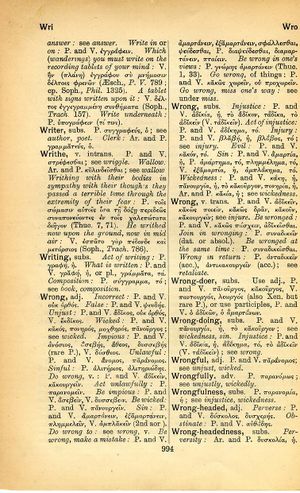wrong-doing: Difference between revisions
From LSJ
ὅτι μέντοι καὶ ἡ χρῆσις τῶν τρόπων, ὥσπερ τἆλλα πάντα καλὰ ἐν λόγοις, προαγωγὸν ἀεὶ πρὸς τὸ ἄμετρον, δῆλον ἤδη, κἂν ἐγὼ μὴ λέγω → however, it is also obvious, even without my saying so, that the use of figures of speech, like other literary adornments, is something that has always tempted toward excess
(CSV5) |
m (Woodhouse1 replacement) |
||
| Line 1: | Line 1: | ||
{{Woodhouse1 | {{Woodhouse1 | ||
|Text=[[File:woodhouse_994.jpg|thumb|link={{filepath:woodhouse_994.jpg}}]] | |Text=[[File:woodhouse_994.jpg|thumb|link={{filepath:woodhouse_994.jpg}}]] | ||
===substantive=== | |||
P. and V. [[πανουργία]], ἡ, τὸ κακοῦργον; see [[wickedness]], [[sin]]. | [[prose|P.]] and [[verse|V.]] [[πανουργία]], ἡ, [[τὸ κακοῦργον]]; see [[wickedness]], [[sin]]. | ||
[[injustice]]: [[prose|P.]] and [[verse|V.]] [[ἀδικία]], ἡ, [[ἀδίκημα]], τό, [[τὸ ἀδικεῖν]] ([[verse|V.]] [[τἀδικεῖν]]); see [[wrong]]. | |||
}} | }} | ||
Revision as of 08:58, 20 May 2020
English > Greek (Woodhouse)
substantive
P. and V. πανουργία, ἡ, τὸ κακοῦργον; see wickedness, sin.
injustice: P. and V. ἀδικία, ἡ, ἀδίκημα, τό, τὸ ἀδικεῖν (V. τἀδικεῖν); see wrong.

